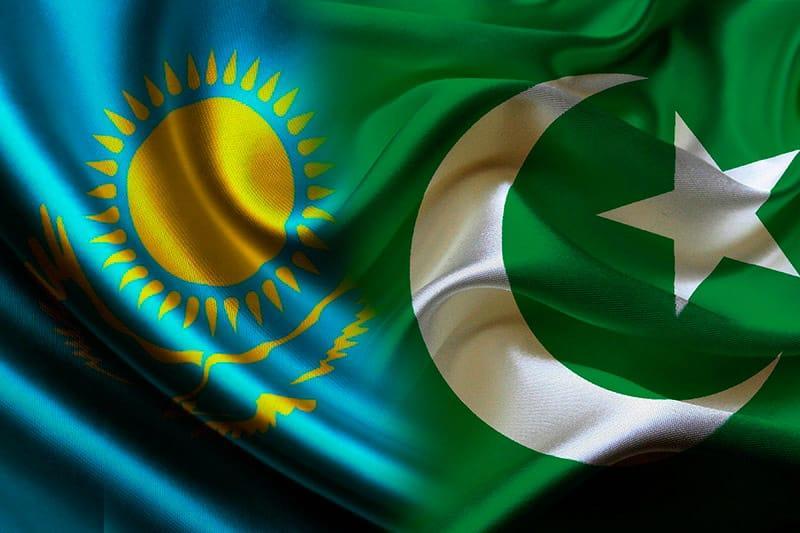During the period of the ancient Silk Road, cities like Quetta, Peshawar, Taxila, Multan, and Debal, which are now part of Pakistan, were linked to this legendary trade route, just like cities of Kazakhstan, including Otrar, Taraz, Turkistan, Sairam, and Almaty.

Photo credit: gov.kz.
Well before the birth of modern Pakistan and Kazakhstan, the All-India Muslim League, under the chairmanship of Quaid-e-Azam Muhammad Ali Jinnah, adopted a resolution on Feb. 23, 1942, in Delhi. This resolution urged the Government of India to make proper arrangements and provisions for Muslim Kazakhs who migrated to India during 1926-1939 due to Soviet atrocities. Consequently, they settled peacefully in northern parts of India (northern areas of current Pakistan).
Commencement of relations

Muhammad Rafiq
Diplomatic relations between the two brotherly nations were established when Nursultan Nazarbayev, the first President of Kazakhstan, visited Pakistan in 1992. Both countries have enjoyed cordial relations, mutual understanding, and a common approach towards global issues. Current developments, such as the prospects for stability after the withdrawal of NATO forces from Afghanistan, the emerging multipolar world, and the expansion of the Belt and Road Initiative (BRI) in Central Asia and South Asia are opening new vistas of opportunities for bilateral trade and investment cooperation, and facilitating regional connectivity. The China-Pakistan Economic Corridor is the flagship project of BRI with an investment of $62 billion that offers Central Asian countries access to the warm waters of Gwadar seaport. Meanwhile, over 75 mega BRI projects worth $35 billion are operating in Kazakhstan not least because of the country’s role as a global transit hub.
Current opportunities
As of 2022, Kazakhstan, with a population of 19.3 million, is the richest country in Central Asia with a record high foreign trade turnover of $134.4 billion. Kazakhstan can be considered an attractive investment hub for several reasons. Firstly, the country has plenty of natural resources, including oil, gas and minerals, as well as significant agricultural potential. Secondly, 70 percent of the transit traffic between China and Europe passes through the country, which also has 24 airports with 72 air corridors. In addition, it is a member of the Eurasian Economic Union, which gives it access to a common market of over 180 million consumers. Finally, the Astana International Finance Centre makes Kazakhstan a key financial hub in the region.
Pakistan, meanwhile, offers access to the fifth-largest population in the world. In addition, 90 percent of the private sector is run by small and medium-sized businesses that contribute 60 percent to GDP. Youth comprises over 120 million people, while the emerging middle class of 80 million people opens up opportunities for sustainable development. In every global assessment, Pakistan has been placed among the top three countries that have efficiently coped with the Covid-19 pandemic. Realizing this potential, the governments of Kazakhstan and Pakistan have embarked upon several projects to usher in a new era of the bilateral relationship.
Embassies and trade missions of both countries are constantly working to promote bilateral trade and business. For instance, an agreement to implement a $500 million project to carry out rail-track rehabilitation from Sukkur to Karachi was signed in November 2021. It is a joint venture project between M/S Habib Syndicate, Aktobe Rail and Section Work, Intra Construction and KazakhExports. The latter is providing $350 million to finance the project.
A Joint Business Council comprising the Federation of Pakistan Chambers of Commerce and Industry and Chamber of International Commerce of Kazakhstan has been established recently that will further improve bilateral trade relations by convening private business companies. In addition, Kazakh airline SCAT is launching direct flights between Almaty-Lahore and Almaty-Karachi this April, which will boost bilateral trade, economy, investment, and tourism.
Furthermore, the National Logistic Cell, Pakistan’s biggest logistic service provider, is about to dispatch its trial caravan of vehicles to Kazakhstan to assess the feasibility of the land route. In addition, Pakistan’s Ministry of Commerce and the Trade Development Authority (TDAP) have invited Kazakhstan as a guest of honor to participate in the 18th edition of the Organisation of Islamic Cooperation Trade Fair in Lahore on June 16-18, which will have a national pavilion that will showcase Kazakhstan’s products and services, and promote the country’s history, culture, and its tourism potential.
Room to grow trade relations
Both countries should also consider utilizing two existing railway links – Pakistan-Iran-Turkey (ECO Train) and Kazakhstan-Turkmenistan-Iran. Connecting these rail routes would be in line with Kazakhstan’s Economic Policy Nurly Zhol and the China Pakistan Economic Corridor project. Kazakhstan is also a member of the Economic Cooperation Organization (ECO). If ECO Train is linked with Kazakhstan’s Khorgos dry port, Khorgos-Gwadar axis can be developed through China’s Xinjiang province and the Karakoram Highway. This would provide landlocked Central Asia with the shortest route to access the warm waters of Pakistani ports and contribute to regional connectivity between South and Central Asia.
According to TDAP, the current trade volume between Pakistan and Kazakhstan amounts to $219 million, which is well below what it could be. Yerzhan Kistafin, Kazakhstan’s Ambassador to Pakistan, is determined to increase the trade volume to $1 billion. Muhammad Farooq, Trade and Investment Officer of Pakistan in Almaty, has also mobilized the Kazakh business community by sharing mutual trade opportunities. For instance, Iranian port Bandar Abbas delivers cargo from Pakistan to Kazakhstan via rail through Turkmenistan.
In contrast, Afghanistan is transporting freight by road through Uzbekistan, Tajikistan, the Kyrgyz Republic, or the Xinjiang province of China via the Kyrgyz Republic. While talking to business representatives at the Karachi Chamber of Commerce and Industry on Feb. 12, 2023, Ambassador Kistafin said “Kazakhstan intends to sign a Transit and Trade Agreement (TTA) with Pakistan, which is very important as it will provide a legal framework to the businesses of both countries to develop trade ties.”
The TTA will accelerate bilateral trade. Kazakhstan’s mission in Pakistan is establishing a Kazakhstan House in Lahore to offer one-window services relating to visa, trade, tourism, culture, education and other areas.
Other areas of cooperation
A relatively new area of cooperation is military. Kazakh military personnel have attended courses on peacekeeping operations in Islamabad. In addition, Kazakhstan is learning from Pakistan’s experience of combating terrorism. Joint counter-terrorist exercises Dostarym-2017 and Dostarym-2019 enhanced the countries’ operational, strategic, and tactical military cooperation.
At the 11th Pakistan and Kazakhstan Inter-Governmental Commission meeting chaired by Deputy Prime Minister and Minister of Trade and Integration Serik Zhumangarin in Islamabad on Dec. 22, 2022, a number of documents were signed on trade, economic, scientific, technological, and cultural cooperation. In November 2022, a Pakistan government delegation visited Astana and met with Zhumangarin to discuss cooperation in the energy sector, particularly gas transit through the Turkmenistan-Afghanistan-Pakistan-India (TAPI) gas pipeline. Syed Murtaza Mahmood, Federal Minister for Industry and Production, said: “Our energy resource demand is growing yearly. Pakistan’s market is extensive, with over 200 million people. Unfortunately, we have no minerals but good transport connectivity and railway infrastructure.”
Both countries also realize the significance of the banking sector. Last year, a memorandum was signed between Kazakhstan’s Bank CenterCredit and Pakistan’s Bank of Punjab to facilitate trade between both countries. However, Islamic banking in Kazakhstan is relatively new and the experience of Meezan Bank, Pakistan’s premier Islamic financial institution, can be utilized.
There is also scope for cooperation in the education sector in the form of a faculty exchange program. Agreements have been signed between the Al-Farabi National University and Abylkas Saginov Karaganda Technical University on the Kazakh side and the Quaid-e-Azam University on the Pakistani side. Approximately 2,500 Pakistani students are part of medical programs at Kazakh universities.
Moreover, a tripartite arrangement between Kazakhstan, Uzbekistan, and Pakistan, supported by direct flights, would significantly boost trade and tourism since these countries have already established options through rail and road.
Upward trajectory
Overall, there has been an increase in business activity in recent years. Negotiations have been held between the management of the leading Kazakh retail chain Magnum and the Pakistani company Nimir Chemicals, which is a leader in producing household chemicals and detergents, as well as personal hygiene products. Herbion Pharma, one of the largest pharmaceutical manufacturers in Pakistan with its popular products like Insty and Linkus, has also discussed further expansion of its products in Kazakhstan. A visiting delegation of Pakistani business representatives also met with regional authorities and representatives of the Atameken Chamber of Commerce and Industry, the Shymkent Chamber of Entrepreneurs, the Turkistan Industrial Zone, and Tassai Industrial Zones.
Policy measures like promoting joint ventures under sovereign guarantee, institutional research to explore preferred sectors, and establishing trade centers in the big cities of both countries would help increase bilateral trade.
During his official visit to Astana in November 2022, Chaudhry Salik Hussain, the Federal Minister of the Board of Investment in Pakistan, said, “We see the great interest of Pakistani business in localizing production in Kazakhstan. In this regard, we believe that investment relations between the countries have great potential and we want to expand cooperation in such areas as energy, agricultural industry, mining, and petrochemistry.”
The author is Muhammad Rafiq (Pakistan), a senior banker based in Kazakhstan with a keen interest in Central Asian studies.

